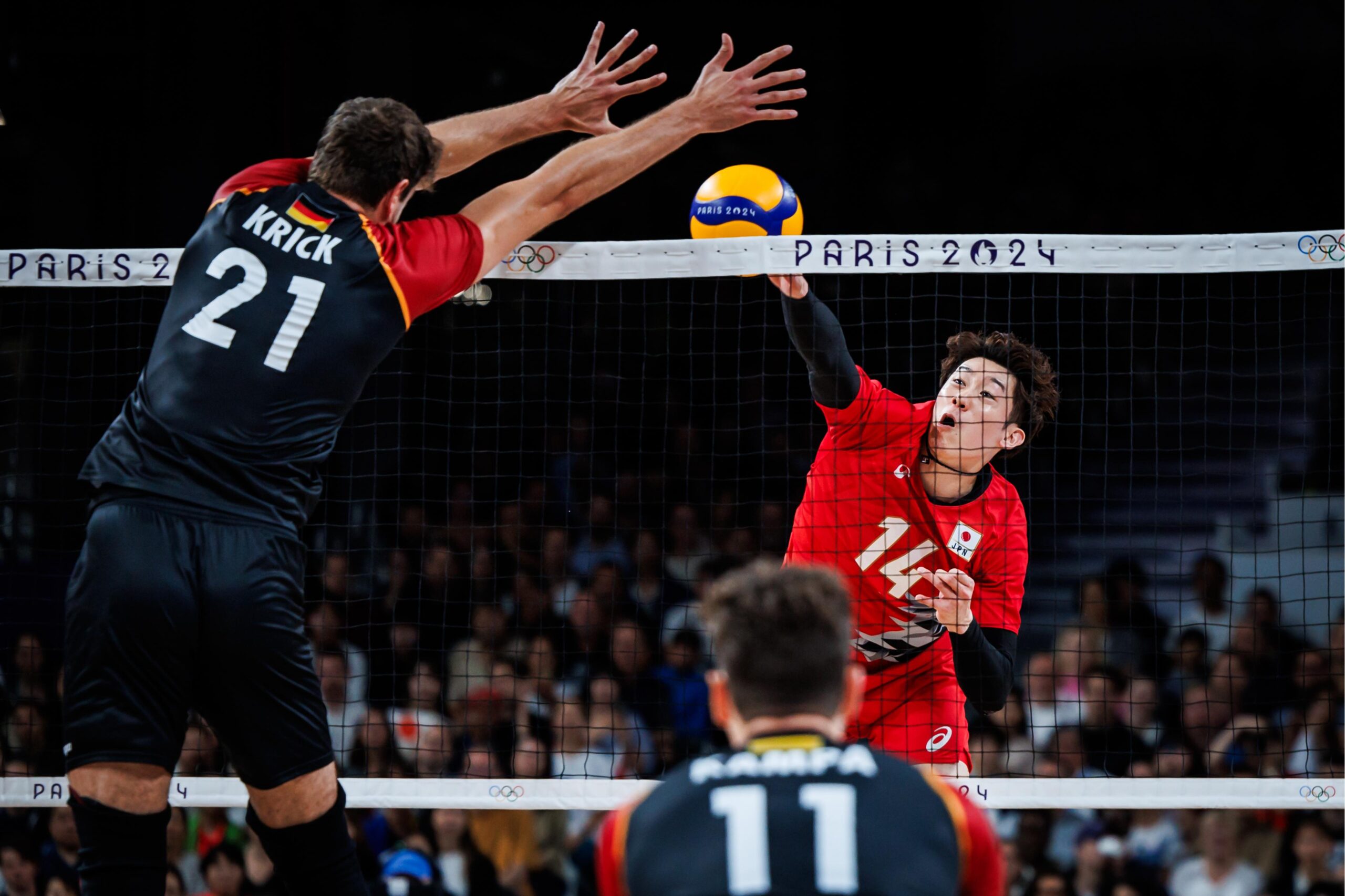In the Paris Olympic qualifying pool C, the Japanese men's national team played against Germany on Saturday, July 27th (local time) and lost 2-3 (17-25, 25-23, 25-20, 12-15).
Starting members
Japan
OH: Ai Takahashi (15), Ishikawa (22)
MB: Onodera (9), Yamauchi (7)
OP: Nishida (20)
S: Sekita
L: Yamamoto
Substitutes: OP Miyaura (3), OH Otsuka (1), S Fukatsu, MB Takahashi Kentaro, OH Kai
Germany
OH: Shot (3), Brand (6)
MB: Brehme (15), Klick (9)
OP: Glozel (24)
S: Campagnolo (5)
L: Zenger
Substitutes: OH Kalicek (11), OH Reichardt (10), S Tille, MB Maassé
*Positions: OH = outside hitter, MB = middle blocker, OP = opposite, S = setter, L = libero
※ () indicates score
Match Report
Set 1
From the beginning, Germany took a large lead of 2-9 with seven consecutive breaks, including two service aces, from OP Grosser's serve. Japan narrowed the gap slightly to 10-14 with spikes and blocks from OP Nishida, but Germany again widened the gap to 10-17 with spikes from OH Brand and a service ace from OP Grosser. Japan continued to make serve errors and was unable to narrow the gap, and in the end, Germany took the set with an attack from OP Grosser at 17-25.
Set 2
Japan scored points mainly from OP Nishida and OH Ishikawa in the early stages, but they made multiple mistakes and were unable to widen the gap, and the match progressed to 8-7. From there, Germany took a 9-12 lead with an attack mistake from OP Nishida and a block from OP Grozelle, but Japan turned the game around with a 13-12 lead thanks to a service ace from OP Nishida and a pipe attack from OH Ishikawa. After that, both teams scored consecutive points, but the score remained close until the end. Japan took the lead at 23-22 with a pipe attack from OH Ishikawa, and finally, OH Takahashi Ai and OH Ishikawa scored consecutive spikes from Japan's defense centered around L Yamamoto, and Japan took the set 25-23.
Third set
From the beginning, after a long rally, OH Takahashi Ai scored to make it 3-1, and then MB Yamauchi spiked and blocked from OH Ishikawa's serve to make it 7-2, giving Japan a big lead. From there, Germany closed the gap to 9-8 with a spike and block from MB Brehme, but OH Ishikawa's spike and other efforts widened the gap again to 14-10. After that, OP Nishida's service ace and MB Onodera's block to stop the opponent OP Grozelle widened the gap to 21-16. In the final stages, MB Onodera scored a spike and a service ace to put Japan on set point at 24-18, and finally OH Ishikawa scored a spike to take the set 25-20.
Fourth set
In the early stages, Japan took a 7-5 lead thanks to spikes and service aces from OP Nishida and MB Onodera. Germany then turned the game around with spikes from OH Kalicek, who entered the game midway through the third set, to 10-12, and then a service ace from OH Reichardt, who also entered the game midway through the third set, and a spike from OP Grosser made it 16-19. Japan replaced OP Nishida with OP Miyaura. From there, Japan tied the score at 21-21 with a service ace from OH Ishikawa and a spike from OH Takahashi Ai, and then OP Miyaura's spike saved Germany's set point at 23-24, and the game went straight to deuce. Japan lost two chances to turn the game around with slight mistakes, but OP Miyaura scored a service ace to finally turn the game around to 28-27. However, in the end, OH Ishikawa allowed consecutive points to be lost due to blocks and mistakes, and Germany took the set 28-30.
Set 5
Germany started off with a service ace from OH Reichardt at 0-1, and then with consecutive blocks from OH Reichardt and MB Klick at 3-7, Germany maintained a large lead. Japan closed the gap to 9-10 with a spike from OH Ishikawa and a service ace from MB Onodera, but they only managed to get one more point. On the other hand, Germany broke from OP Grozelle's serve and had a match point at 11-14. Finally, Germany won the set with a tip from OH Kalicek, dropping it to the front of the court, and took the set at 12-15, winning the fierce full-set battle.
TOSHIKI'S MVP
Germany: OP Jorge Grosser
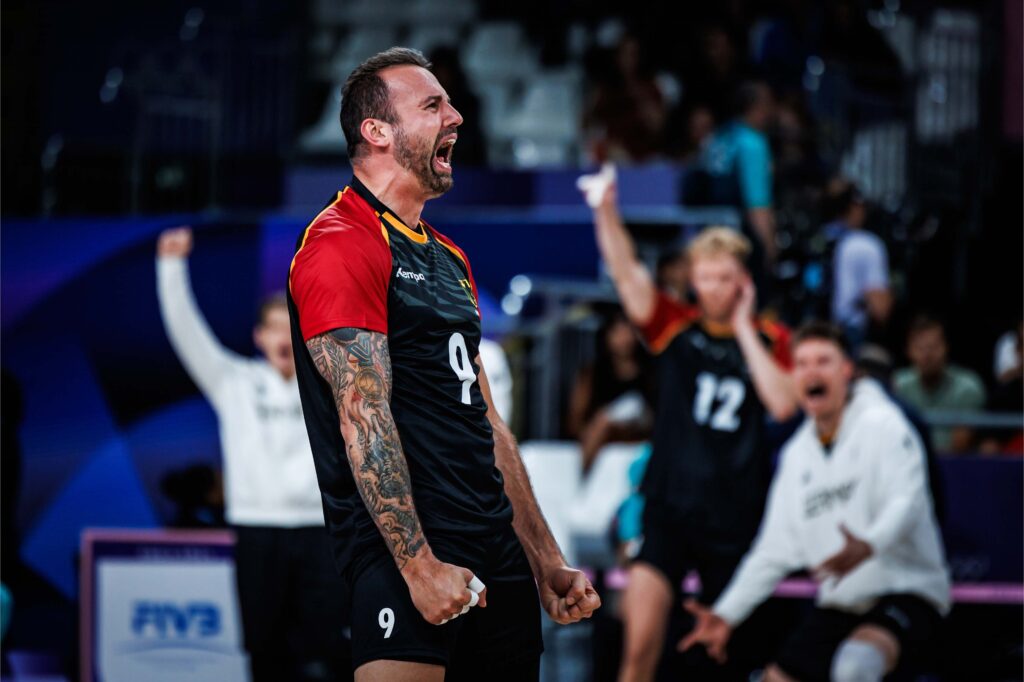
24 points (5 blocks, 4 serves), attack efficiency rate 22.221 TP 3T
He made a huge impact from his serve in the beginning of the first set, and continued to put pressure on Japan with his serve, block and spike. Although his spike performance dropped in the second and third sets, he recovered from the fourth set. The 39-year-old was a king monster who showed no signs of slowing down even in tough full-set matches.
Japan: L. Yamamoto Tomohiro
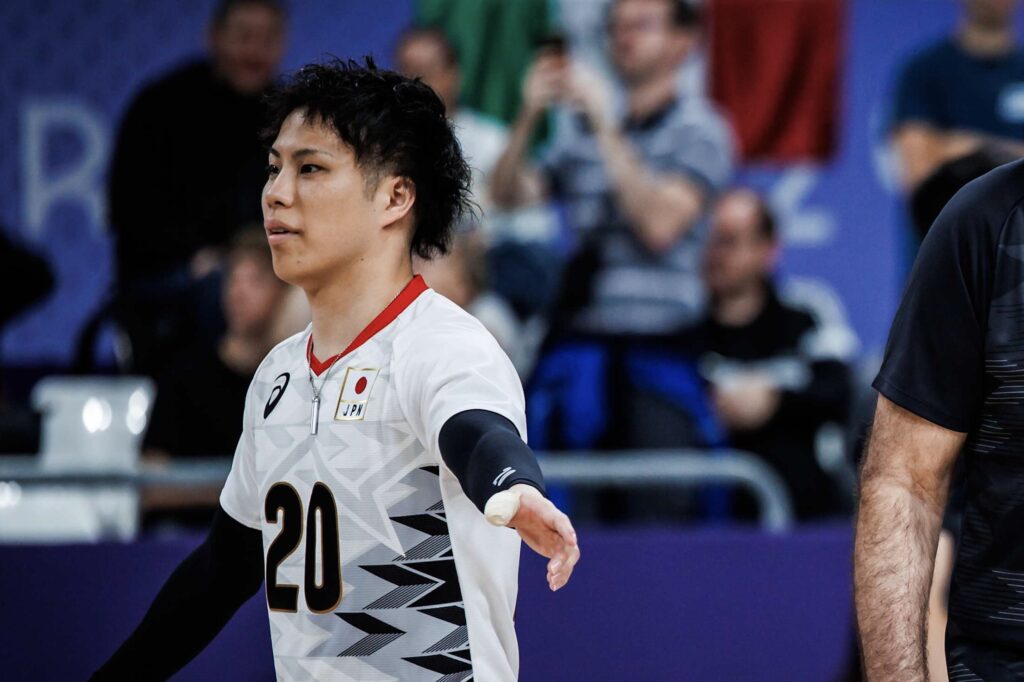
Serve reception success rate: 36.671 TP3T, 15 digs
While many players had periods of poor form, Yamamoto was able to perform his usual duties throughout the match. He not only digged well, but also maintained his serve reception, something he struggled with in the Nations League against Germany, without conceding any direct points.
Also, his fine play for the 24th point in the second set and his picking up the opponent's direct spike for the 20th point in the fourth set were thrilling.
Commentary
The match between the two teams, both with good serves and defenses, was a long one as expected. It was a long and drawn-out match, not only because it went to a full set, but also because there were few attacks that were decided by a single point, and there were many exciting rallies.
The three points that determined the outcome of the game were: 1) the number of runs conceded, 2) the success rate of middle blockers, and 3) the depth of the player pool.
Point 1: Number of goals conceded
Traditionally, Japan's strength has been making fewer mistakes and conceding fewer attacking points (blocks and attacking mistakes such as hitting the ball out or into the net), but this time they made more of these mistakes.
Germany's attack loss was 15 points, while Japan's loss was 29 points, which is almost twice as many points. All three outside hitters, OH Ishikawa, OH Takahashi Ai, and OP Nishida, had an attack effectiveness rate of 20% or so, which is a rare figure these days.
There were certainly long rallies in this match, but there were few scenes where Japan got the rebound and turned the ball around like in the past. I don't know how Germany dealt with this, but I think they had some kind of strategy to prevent Germany from getting the rebound easily.
As for mistakes, especially at the end of the fourth set, Germany challenged Japan twice, but both times Japan's mistakes were discovered and Japan missed the chance to turn the game around. It was a very slight touch of the net and antenna, but this kind of mistake was rare and not seen much in Japan up until now (although the German bench was also amazing in this regard, as they made the right challenge).
In that sense, Japan's strengths were not fully demonstrated in this match.
Point 2: Middle blocker's decisiveness
I think Japan's defense responded well to Germany's side attacks, but they were able to score a lot of their mid-range shots.
Both German middle blockers had high attacking effectiveness: MB Brehme scored 12 points (effectiveness rate 85.711 TP3T) and MB Klick scored 7 points (effectiveness rate 77.781 TP3T). By the way, MB Onodera scored 4 points (effectiveness rate 22.221 TP3T) and MB Yamauchi scored 4 points (effectiveness rate 10.001 TP3T).
Because Japan was unable to put pressure on Germany's mid-range attacks, Germany was able to get side-outs relatively easily, which I think ultimately gave them an advantage in the game.
Even in last week's friendly match against Poland, which Japan won, they were unable to deal with Poland's quick attacks. The next match, Argentina, is also a team with strong mid-range shots, so we need to improve our defense against the opponent's mid-range shots and, conversely, Japan should be able to attack from the middle.
Point 3: Depth of player pool
Germany had a deep bench of players.
This time, both outside hitters were replaced midway through the third set, and the two replacements performed brilliantly towards the end of the match, making a major contribution to the victory.
There are very few teams that can win by replacing two outside hitters, let alone one. The only other teams that come to mind are Poland and France. Serbia might also be included.
When a player is substituted during a match, the team that was substituted naturally has to adapt to the new player.
In an interview after the Nations League final, it was stated that one of the reasons for Japan's loss to France was that libero Yamamoto was unable to deal with OH Tille, who came on as a substitute, but with two more players in the same situation at the same time, it must have been very difficult for Japan to respond.
OH shots were not attacking well to begin with, and OH Brand and OP Grozelle had been losing their attacking form since the second set. Japan had completely disabled Germany's side attackers until halfway through the match, so they were completely defeated by Coach Wienialski's strategy and the two players who responded to it and took to the court.
Overall: Germany handled it well
As you can see from the fact that they conceded more points than usual, Japan's condition was not good. In particular, in the first set, it seemed that the toss with S. Sekita was not in sync, which was unusual. During the serve, OH Ishikawa sometimes showed a gesture that made him seem to be concerned about the camera.
That being said, it's not to say that Germany was in good form; they certainly were in good form in the first set, but after that they struggled as Japan lost two of their outside hitters and OP Grozelle's form dropped.
Coach Wijnalski courageously changed both of his outside hitters, OH Kalicek and OH Reichardt responded, and the German team, including S. Campagna, made good use of them and also brought back OP Grosser, was fantastic.
In this way, Germany was able to respond to Japan which responded to Germany, but Japan was unable to respond to Germany.
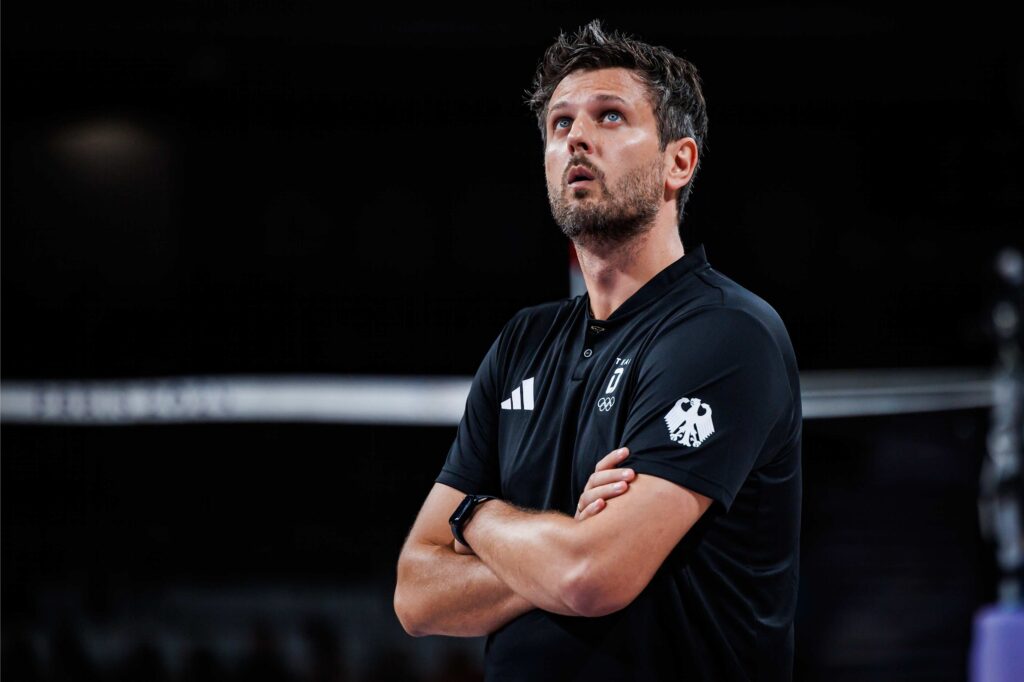
Unfortunately, we started the Paris Olympics with a loss, but the fact that we were able to win one point in a full set is very important for us to advance through the qualifiers. As we can see from the recent Rio and Tokyo Olympics, both teams that struggled in the qualifiers and barely made it through went on to win the championship, if we can just advance to the quarterfinals, anything can happen.
The remaining opponents in the qualifiers are strong teams such as Argentina and the United States, but I am sure the current Japanese national team will do their best.
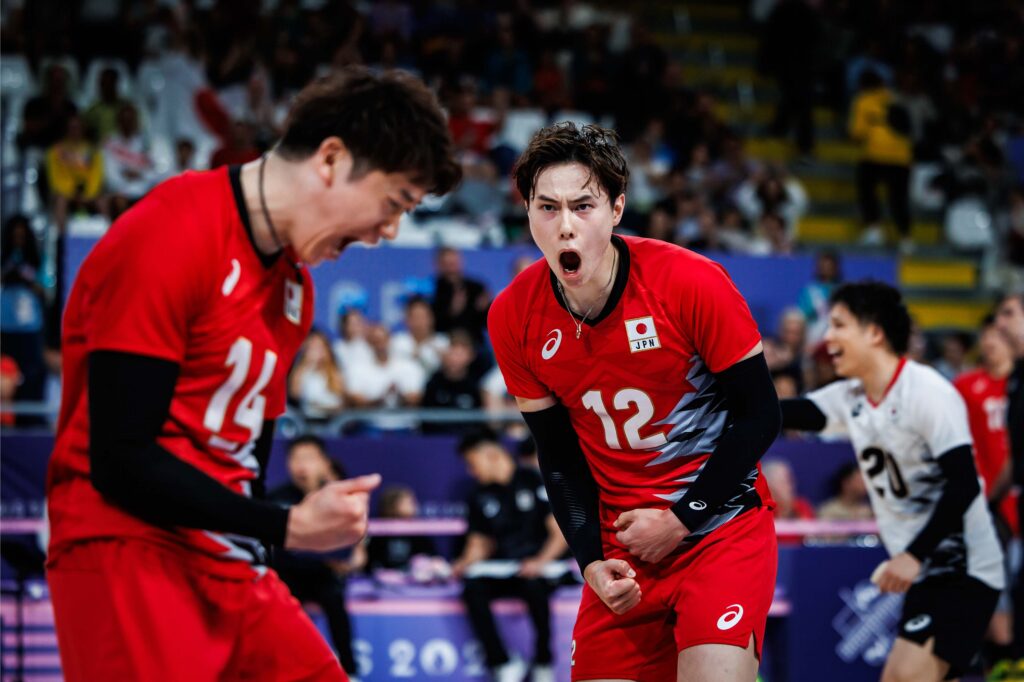
Pool C standings (as of July 27th)
*A total of eight teams, including the six teams ranked second or higher in each pool and the top two third-placed teams, will advance to the final tournament.
1st place USA 1 win 3 points
2nd place Germany 1 win 2 points
3rd place Japan 0 wins 1 point
4th Argentina 0 wins 0 points
Next race information
Qualifying Pool C vs Argentina
July 31 (Wed) 20:00~ (Japan time)
tv set
NHK General TV: 20:00~
Online distribution
NHK Plus
[PR] "ALL for DREAM -Footsteps to Glory- Japan Volleyball National Team Nations League 2024" will be available on U-NEXT from July 27th (Sat.)
A documentary program that closely follows the unknown behind-the-scenes of the "Volleyball Nations League 2024" and traces the fierce battles will be streamed on U-NEXT.
[Distribution date and time]
July 27th (Saturday) 5pm Boys #1 Boys #2
August 3rd (Saturday) 5pm Women's #1
Saturday, August 10th 5pm Women's #2
Saturday, August 24th 5pm Men's #3
Saturday, August 31st 5pm Women's #3
September 7th (Saturday) 5pm Men's #4
Saturday, September 14th 5pm Women's #4
(Quoted from TBS TV release)
U-NEXT offers a 30-day free trial! Click the banner below to sign up!

Photo: Volleyball World
